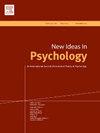Artificial intelligence in lie detection: Why do cognitive theories matter?
IF 2.9
3区 心理学
Q2 PSYCHOLOGY, EXPERIMENTAL
引用次数: 0
Abstract
In the field of psychological research on deception detection, the rise of machine learning algorithms, or artificial intelligence (AI), has sparked discussions about its potential benefits and risks. Most researchers argue strongly for the inclusion of good theories in the design, training, and application phases of AI. In this letter we ask an important follow-up question: what makes a good theory? And why do they matter in detecting deception? To this end, we argue that mechanism-driven, and cognitively-informed, theories are the ones AI researchers need to be looking for. This is particularly important in deception detection, where false positives and negatives can result in irreversible legal consequences. Crucially, mechanism-driven theories allow us to know 1) what features are we extracting (e.g., a particular facial expression in time, higher peak in P300, etc.)? And importantly, 2) how are these features related (subordinate or superordinate) to the entity we are inferring (e.g., memory recognition, anxiety, or deception)? Answers to these questions can help forensic experts anticipate where the majority of our AI's mistakes are (i.e., false negatives or false positives), and allow nonexperts such as policymakers to adjust decision-making criterion to compensate for such errors via legal or other means if needed be (e.g., a more liberal criterion for detecting deception during the investigation phase, but later switches to conservative criterion in court). These logical inferences all start from mechanistically and cognitively-informative theories.
人工智能测谎:认知理论为何重要?
在有关欺骗检测的心理学研究领域,机器学习算法或人工智能(AI)的兴起引发了有关其潜在益处和风险的讨论。大多数研究人员强烈主张在人工智能的设计、训练和应用阶段纳入良好的理论。在这封信中,我们提出了一个重要的后续问题:什么是好的理论?为什么它们对检测欺骗行为很重要?为此,我们认为,人工智能研究人员需要寻找的是以机制为驱动、以认知为基础的理论。这一点在欺骗检测中尤为重要,因为在欺骗检测中,假阳性和假阴性都可能导致无法挽回的法律后果。至关重要的是,机制驱动理论能让我们知道:1)我们正在提取哪些特征(例如,特定时间的面部表情、P300 的较高峰值等)?重要的是,2)这些特征与我们正在推断的实体(如记忆识别、焦虑或欺骗)是如何相关的(从属或上级)?这些问题的答案可以帮助法医专家预测人工智能的大部分错误(即假阴性或假阳性),并允许决策者等非专家在必要时通过法律或其他手段调整决策标准以弥补这些错误(例如,在调查阶段采用更宽松的标准来检测欺骗行为,但随后在法庭上改用保守的标准)。这些逻辑推论都是从机械和认知信息理论出发的。
本文章由计算机程序翻译,如有差异,请以英文原文为准。
求助全文
约1分钟内获得全文
求助全文
来源期刊

New Ideas in Psychology
Multiple-
CiteScore
4.80
自引率
3.80%
发文量
37
期刊介绍:
New Ideas in Psychology is a journal for theoretical psychology in its broadest sense. We are looking for new and seminal ideas, from within Psychology and from other fields that have something to bring to Psychology. We welcome presentations and criticisms of theory, of background metaphysics, and of fundamental issues of method, both empirical and conceptual. We put special emphasis on the need for informed discussion of psychological theories to be interdisciplinary. Empirical papers are accepted at New Ideas in Psychology, but only as long as they focus on conceptual issues and are theoretically creative. We are also open to comments or debate, interviews, and book reviews.
 求助内容:
求助内容: 应助结果提醒方式:
应助结果提醒方式:


